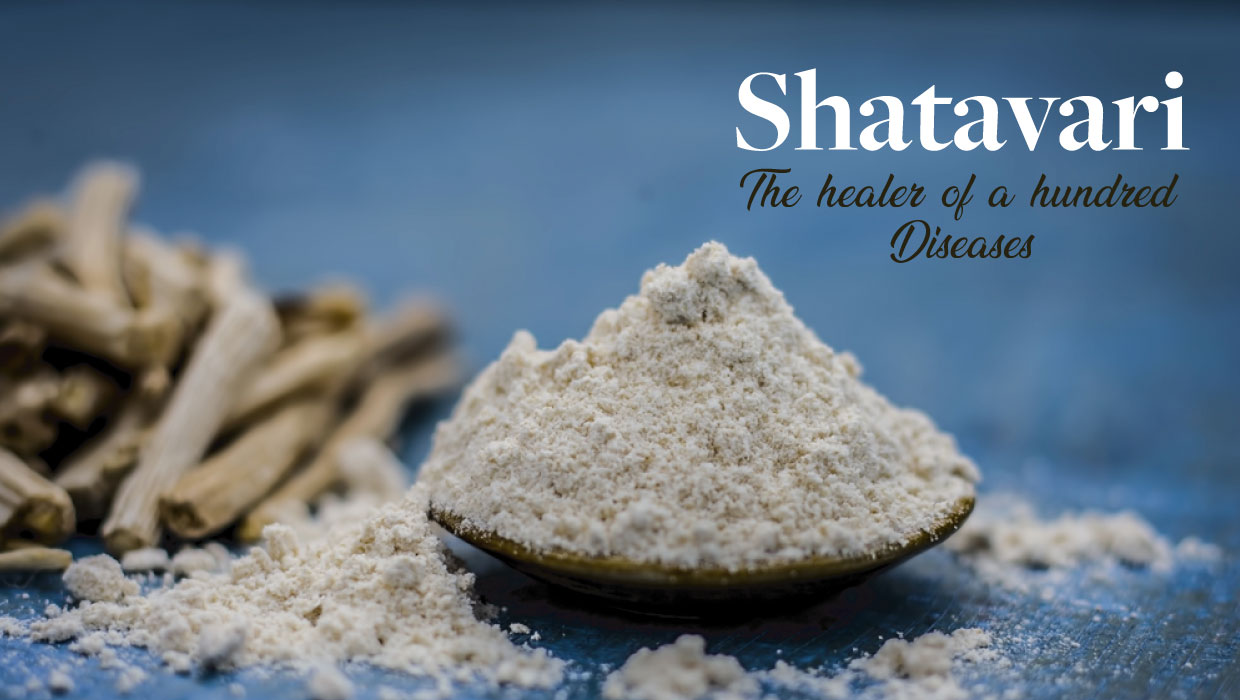Asparagus Racemosus aka Shatavari is one of the most important, extremely useful, and immensely respected herbs of the plant kingdom.
Found mostly in South Asia, it has been used in Ayurvedic practices for centuries.
The cooling, healing, aphrodisiac, and rejuvenating properties of Shatavari, is what makes her the Queen of herbs.
Shatavari finds her evidence straight from the Vedas, first mentioned in Rigveda, Shatavari is a notable first preference in gynecological disorders and concerns referring to the female family at any phase in their lives.
Shatavari with her bittersweet taste and cooling properties is heavy in nature, slimy, and is considered to be extremely Satvik, meaning it is extremely pure and will strive to keep your mental equilibrium in balance. Isn’t she an absolute Queen? 
Shatavari and the Doshas
Shatavari perfectly balances the Vata and Pitta energies. Its cooling properties efficiently help to subside the unbalanced Pitta dosha, which is the bioenergy responsible for all things heat and fire, hence making it a perfect cure in the management of gastritis, ulcers, and hyper-acidity.
Moreover, the herb works on all the Dhatus, the seven tissues of the body and it even functions at the minute channels and openings called Strotamsi. This shows and refers that the herb can efficiently work on minute cellular levels giving you absolute optimum results when consumed.
Shatavari for Women Health, Why it is so important?
Power-packed with steroidal saponins, flavonoids, phytoestrogens, and minerals like zinc, calcium, magnesium, potassium, and selenium, Shatavari is a helping hand in all female related concerns. Right from menstrual issues to infertility, from menopause to cancer, Shatavari is your best friend.
Shatavari is an often prescribed herb for fixing an unbalanced ovarian cycle, balancing haywire hormones, and checking the menopausal blues.
Consuming Shatavari has proved to have a greater impact on skin health, texture, and glow. It evidently acts on acne and even heals the tempered skin barrier. As said, Shatavari fixes unbalanced hormones and acts as a blood cleanser that reflects directly on the skin.
It is also a preferred choice for pregnant women and lactating mothers. Shatavari helps to improve the quality of breast milk and add in a whole lot of additional nutritional value which helps the baby in its overall growth.
Shatavari is your ultimate Rejuvenator
Shatavari is classically referred to as a Rasayana, meaning it has rejuvenating properties. Consuming Shatavari helps you to enhance the lifespan and the quality of your life, slow down ageing, promote mental and physical health and evidently increase immunity.
The root, with its antioxidant and adaptogenic properties delays cell degeneration, maintains and nourishes the rasa dhatu, the first of the seven boy tissues, ultimately acting as an excellent rejuvenator and immunity enhancer.
Shatavari for Hyper-acidity and Body Heat
Increased or out-of-balance Pitta may look like excess heat in the body, ulcers, unexplained inflammation and burning sensations, hyper-acidity among other symptoms.
Shatavari, with its bittersweet taste, a good sweet after-taste and cooling properties is an excellent cure to fix the unbalanced Pitta dosha. The one with the predominant fire element.
It is said to even out the mucosal membrane, heal internal wounds and promote quick relief in conditions like Gastric, Peptic and Mouth ulcers.
Shatavari with its notable anti-inflammatory properties is also known to reduce inflammation and bodily uneasiness.
Along with it, Shatavari, when consumed, optimizes the absorptive nature of the stomach and intestine and checks hyperacidity, colitis, candida, loss of appetite, abdominal pain, excessive thirst, and vomiting.
Moreover, general weakness caused due to long term fever and heat can be covered with the help of this healing herb.
Shatavari for Mental Health
Shatavari is an excellent adaptogen, meaning it helps the body manage stress, both physically and mentally.
Components of Shatavari are said to reduce the production of stress hormones and increase the production of hormones that makes one feel calm and happy, referring to the herb’s anti-stress, anti-anxiety and anti-depression qualities.
Also as mentioned above, Shatavari is Satvik, meaning it strives to keep your mental environment clean, safe and sound.
Moreover, the herb with its remarkable Vata balancing properties show significantly positive results in mental and neurological disorders like anxiety, depression, ADHD, Alzheimer’s disease, atrophy of the brain tissues, parkinsonism, etc
Shatavari, a Reproductive tonic
Shatavari is also classically referred to as a powerful aphrodisiac. It shows positive results on both genders when consumed.
Shatavari is said to be a potent tonic for reproduction, it also promotes the chances of pregnancy as it balances female hormones, nourishes the ovum, and nurtures the reproductive organs in the cases of female infertility.
It improves sperm quality and sperm count in males. Improves overall sexual capacity and vigor. The herb gives excellent results in azoospermia, oligospermia, and other problems related to male infertility.

Along with the above-said benefits, Shatavari is a very potent Cardiac tonic, it strengthens and nourishes the heart muscles, checks hypertension and cholesterol and strives to keep your heart healthy and pumping.
Shatavari also works in conditions like diarrhea, dysentery, chronic fever, hematemesis, herpes, lung abscess, ulcers and rheumatism. It has also proved efficient in many degenerative disorders like AIDS and Tuberculosis.
Overall Shatavari is the Queen of herbs, living up to her title. The benefits that it provides are innumerable and extraordinary. It is truly a blessing to have a herb with such excellent healing properties.
Shatavari is a very effective way and smart choice to bring back balance, improve vitality and quality of your life.
Join us to read more of such articles and support our mission of mindful living for the modern world by subscribing to our blog and hitting us a follow on Instagram and Facebook @sarvedalife.

